#meta-four
Text
Lash Legend ~ Otis
430 notes
·
View notes
Text

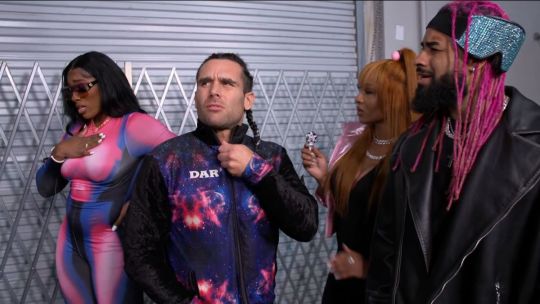
Lash is still stuck in last week.
32 notes
·
View notes
Text


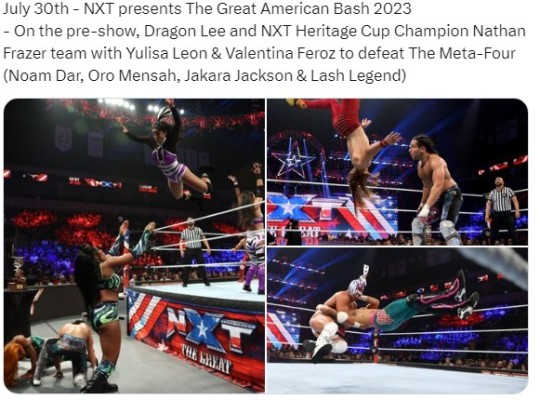
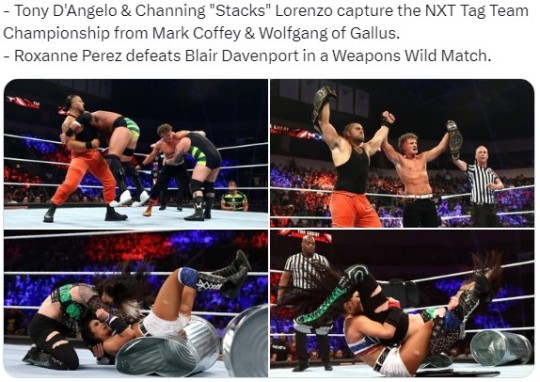

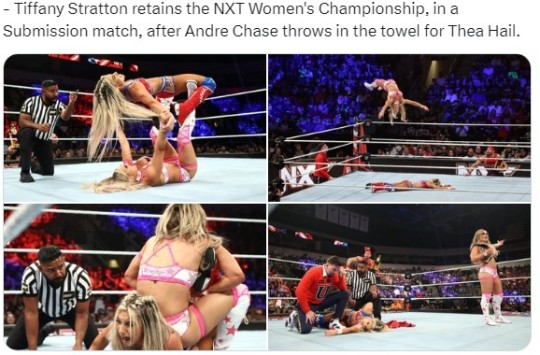
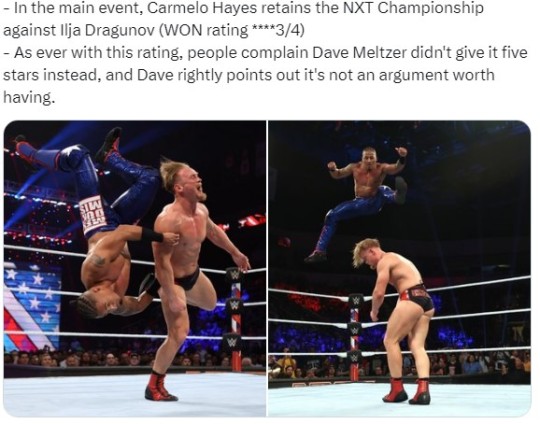

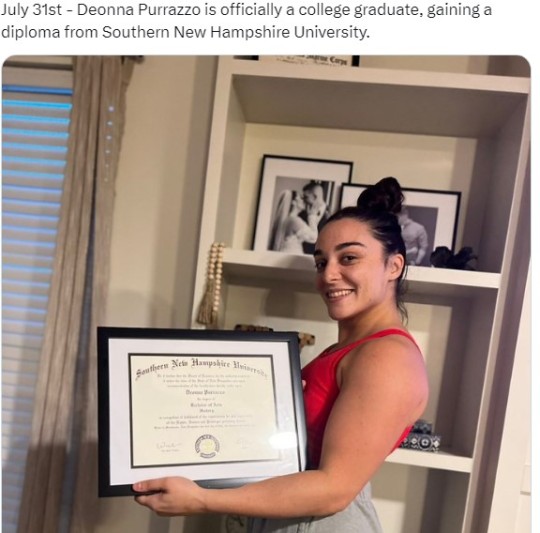
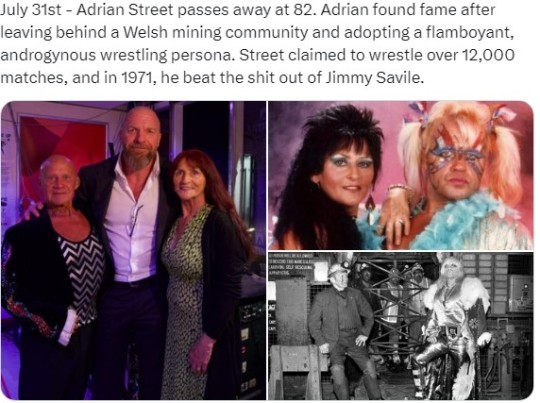


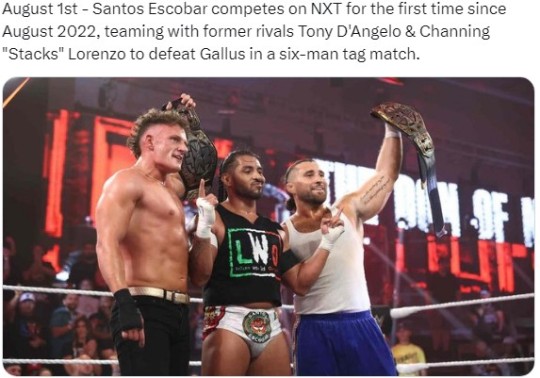

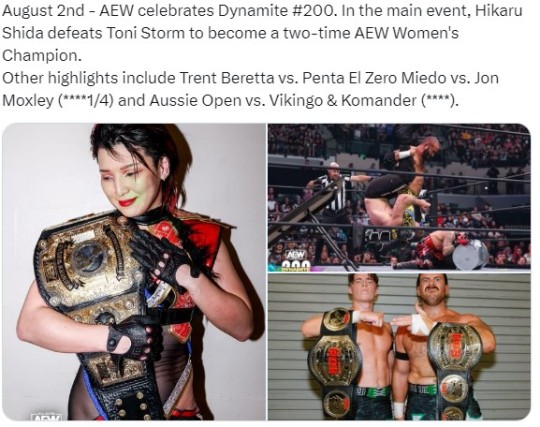
#wrestling is weird#orange cassidy#nxt#great american bash#dragon lee#nathan frazer#yulisa leon#valentina feroz#meta-four#noam dar#oro mensah#jakara jackson#lash legend#tony d'angelo#channing stacks lorenzo#mark coffey#wolfgang#gallus#roxanne perez#blair davenport#gable steveson#baron corbin#dominik mysterio#wes lee#mustafa ali#tiffany stratton#thea hail#andre chase#carmelo hayes#ilja dragunov
13 notes
·
View notes
Text

💫 Comet: a small celestial object with a core of ice, a leftover from the formation of a star.
Seeing one is historically considered a bad omen—inspiring fear, awe, and dread in those who witness it.
#snappy’s art tag#my art#kirby#meta knight#Galaxia#super smash bros#smash ultimate#this is a reference to his final smash!! they somehow managed to make him even edgier#bats#also fun fact! some comets have four tails but that can only be observed with special equipment#I wanted to include it in the caption to reference his four wings but it was too long
2K notes
·
View notes
Text
In terms of trying to transplant how Dick’s generation grew up to independent adult heroes onto Tim’s generation, one of the significant issues is that the two groups have very different backstories.
The Fab Five and their generation were largely cared for children with present guardians during their teen years. Their ‘growing up’ rebellion moments were about wanting to establish their own identities separate to their parent/guardian. Then once NTT occurred and new young adult characters were added to it, you had a bunch who were escaping overbearing guardians with expectations the young adult didn’t want to fulfil, and leaving trauma behind.
The Core Four and other 90s heroes, in contrast, were mostly latchkey kids. They had loving but absent parents and parental figures. They were largely expected to grow up and show they were independent in their early teens. The arcs of their stories were not about growing up and finding themselves and ‘be your own person’, but about learning to trust others and interdependency and working together.
Like the shape of a Fab Five story is ‘in my preteens or earlier a Disaster Happened and I was taken in by a hero who cared for me and taught me the business as their sidekick. Then around 18-20 I moved out to live in a sharehouse with my friends as I wanted to find who I was outside of the shadow of being a sidekick’.
While…Tim’s generation largely aren’t sidekicks in the same sense. The shape of THEIR stories are of ‘teenager with largely absent adults is expected to grow up and show emotional maturity too early’. It’s actually notable that Tim, Kon and Bart all have long term story arcs that involve gaining a stable household right near the end.
Kon’s entire solo is the story of how he is neglected and exploited by every adult around him. He doesn’t have parents. He’s Peter Pan, the little boy who cannot grow up, who lives without parental expectation. He’s a celebrity kid exploited by Rex Leech and by CADMUS, who’s expected by those around him to act in an adult manner and held to that standard while simultaneously specifically being underage and not having the right to make his own decisions. His final arc in Superboy is about being so abandoned he doesn’t even have CADMUS to depend on anymore so he has to find an apartment and a job (the building superintendent) and is expected to act and function like an adult in that position. Superboy #59 (FIFTY NINE) is when Kon finally gets his own name. Superboy #100 is ABOUT Kon moving in with Jonathan and Martha Kent and finally having a stable home environment where he can be a child. Heck Kon’s already had a story where he’s ‘married’ and responsible for a kid. He’s had solo space adventures.
Bart’s solo is about Bart and Max learning to be a family together, but also: Bart’s childhood didn’t contain parents. Meloni turns up occasionally through his solo and loves him but also has to disappear away back to the 30th century at the end of each appearance. The final arc of Bart’s solo is about him moving in with Jay and Joan Garrick for more stability, because Max has disappeared (and stays disappeared). And then, post his solo, Bart even already has HAD an arc where he had to grow up and assume the Flash mantle (which went horribly wrong and led to his death).
Tim? Tim’s entire solo is about upheaval and change. The first time he’s expected to behave as an independent hero, not a sidekick, is literally Robin #1 when Azbats kicks him out of the Cave. Jack threatens to send him away to boarding school on multiple occasions and DOES for the Brentwood arc. He loses Jack, he loses Dana, he moves out to be a hero caring for his own city at 16, in Bludhaven post War Games. Bruce’s adoption of Tim was all about giving him back that sense of stability and support so that Tim had people backing him up again in his personal life and not only as a hero. And then he does the ‘leave and get a new identity’ thing during Red Robin.
And Cassie? Cassie starts with a loving mother and her story arc over becoming a hero is about periods of operating on her own. She moves away from her mum to go to Elias School. Due to operating as a hero under her own name she eventually has to come up with the alias of Drusilla Priam to give herself a non-public identity to retreat to (and isn’t living with Helena Sandsmark but renting on her own during this period to protect Helena).
This is a set of characters for whom it makes no narrative sense to tell a story of them growing up by ‘moving out and finding their own identity as separate heroes’ because their entire PAST is about being alone and looking for connections and people to rely upon. They haven’t been looking for their mentors to accept them as independent adults, they’ve been looking to their mentors to be present and work with them.
They have already all BEEN through the steps of moving out (while underage) and learning to look after themselves as nobody else was there to support them. Growing up for them is about learning to trust and be respected for the skills they already have and trusted to know what they’re doing, rather than leaving to show they can operate independently.
And that’s a harder narrative to show, because it’s a less common growth story in our culture. But in the Core Four’s case, I’d argue a lot of the traditional signifiers of adulthood (moving out; moving away for education; taking responsibility for a city on their own; travelling for quests) are things they were already expected to do while still significantly underage, and so sending them through that plot again isn’t showing anything new to allow them growth. What they need is the adults around them to treat them as adults for the things they already can and do do.
707 notes
·
View notes
Text
oh god i just realised barry did get redemption. hes been begging god to wash away his sins as if they never happened to be seen as a good man and he fucking got it. the whole world thinks that he was a hero. buried in arlington cemetery with full honours. god is propaganda. god is hollywood.
#he is in hell tho. fuck you crusty murder boy i hope the devil shits on you.#barry#barry hbo#hbo barry#barry meta#barry spoilers#barry finale#barry season four#barry season 4#barry s4#bill hader#alec berg#barry berkman#gene cousineau#sally reed#noho hank#cristobal sifuentes#monroe fuches
1K notes
·
View notes
Text
Thinking about Jon’s time with the Circus again. Thinking about what a month spent in a refrigerated warehouse would do (because it would have to be refrigerated, wouldn’t it? it’s meant to store waxworks), just how cold his skin would be. Do you think it even still felt like his skin? Do you think his fingers brushed the skin of his arm and felt only the inhuman chill of wax, and his arm received the touch of his hand and felt only the dead press of plastic?
Thinking about how thoroughly his time with the Stranger would have made him a stranger to himself.
#i’ve been meaning to put this detail into a fic for ages but i can’t quite fit in in anywhere#i’m considering making a dedicated oneshot just to exploring jon’s relationship with his skin post-kidnapping#but i already have a couple post-kidnapping fics and i’m working on another one and i don’t want to become like. the kidnapping guy#I feel like four fics about it would be too many#so for now i’m just throwing it onto tumblr#tma#the magnus archives#tma season three#tma meta#jonathan sims#nikola orsinov#tma the stranger#circus of the other#mag 101
374 notes
·
View notes
Text
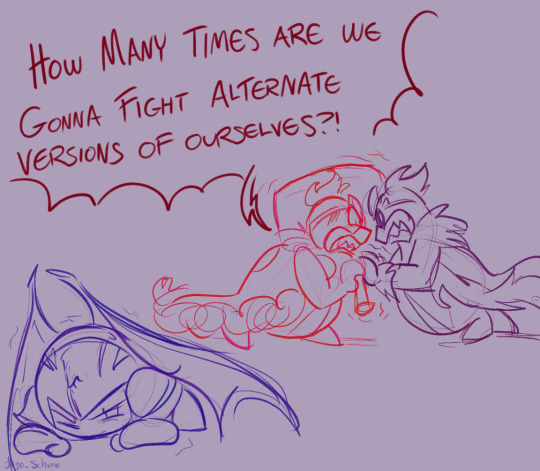
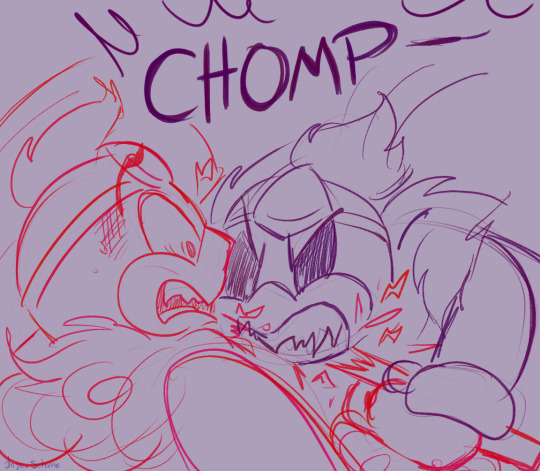
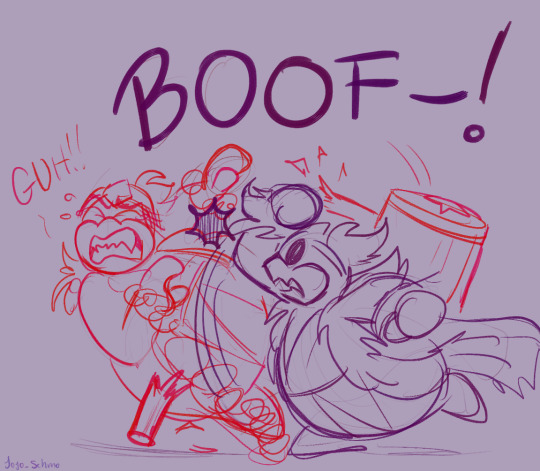
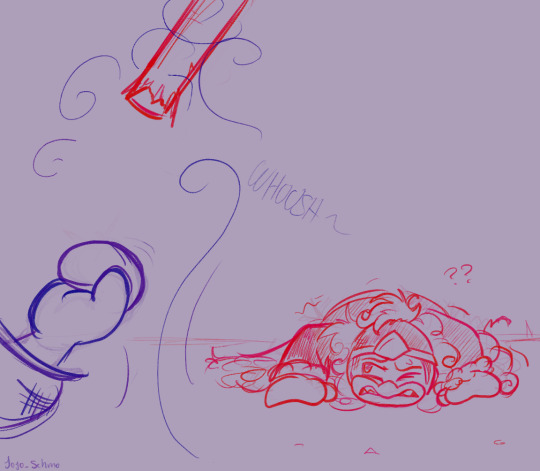
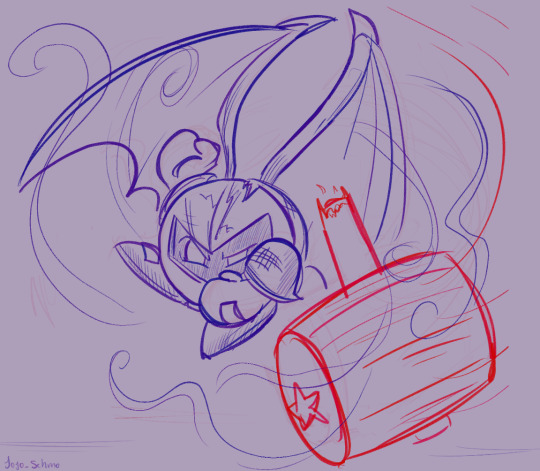
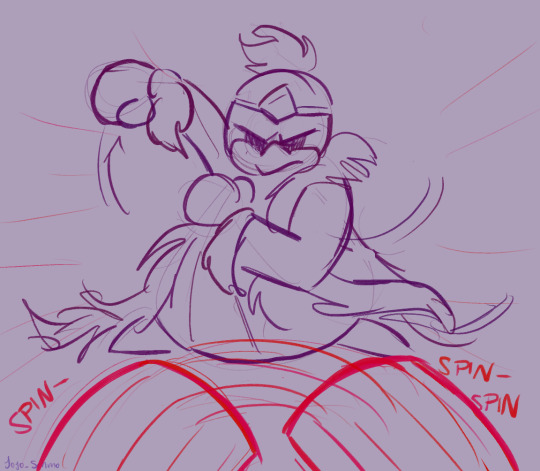
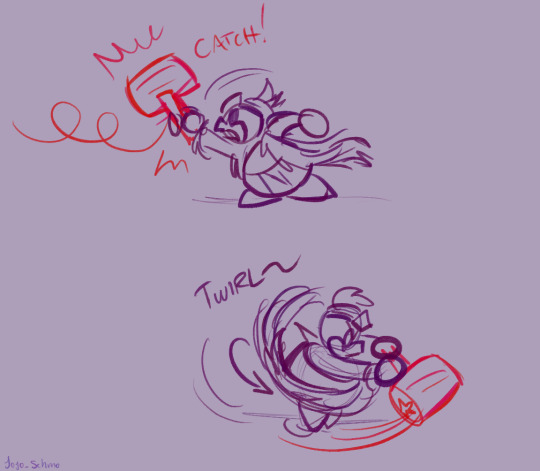
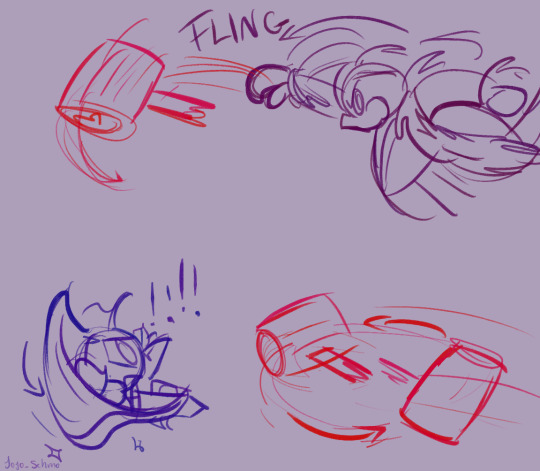
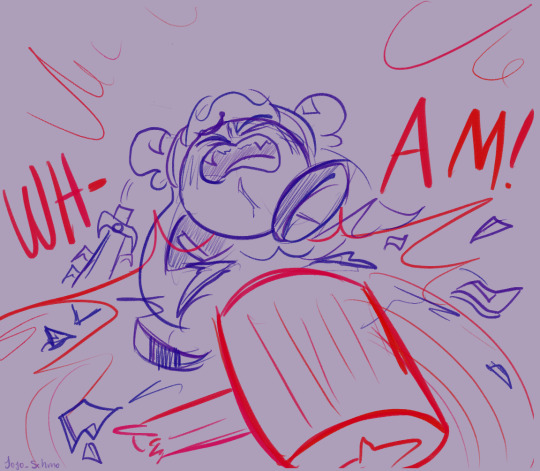
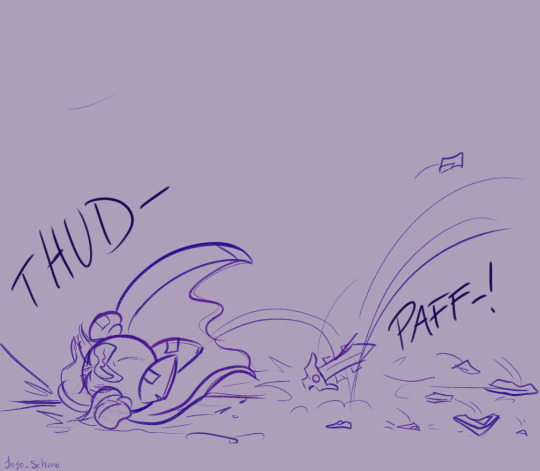
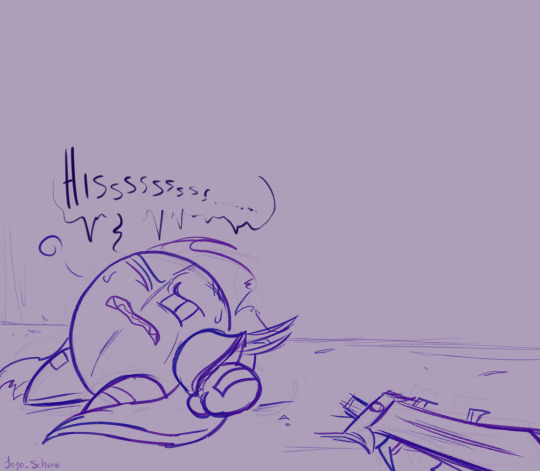
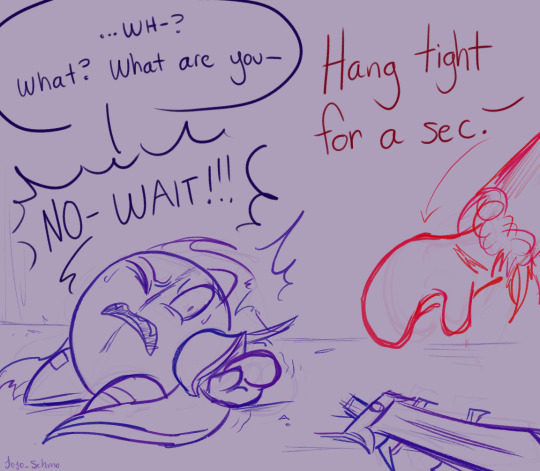
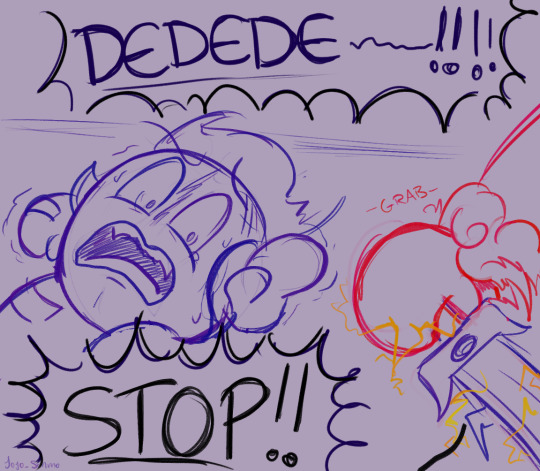
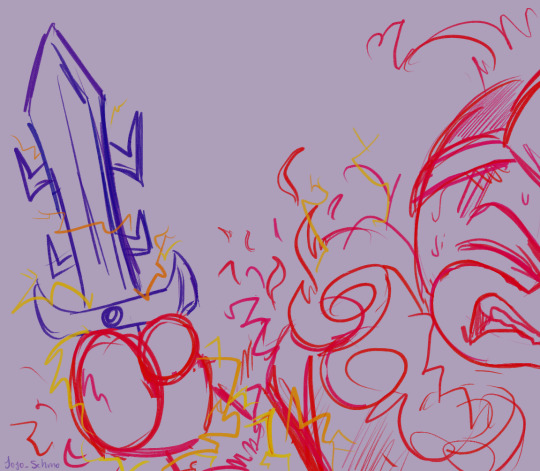
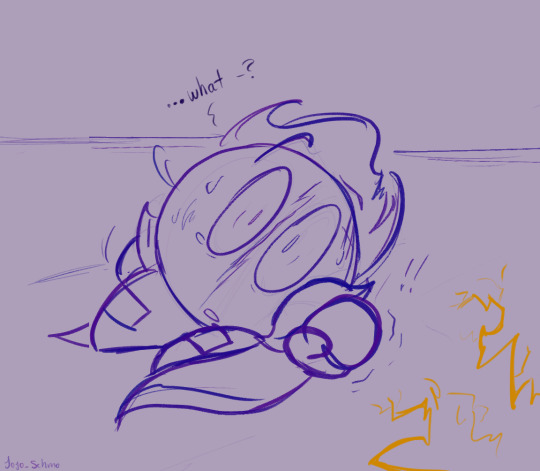
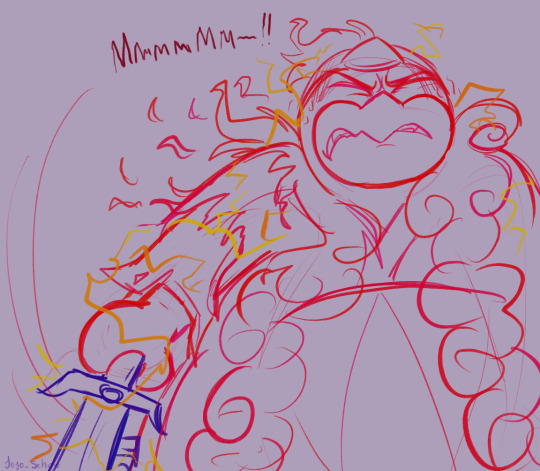
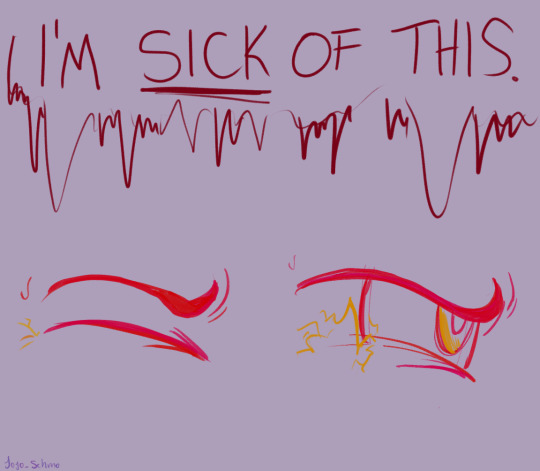
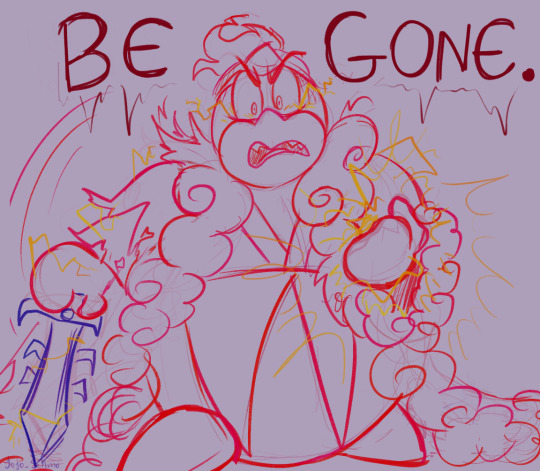
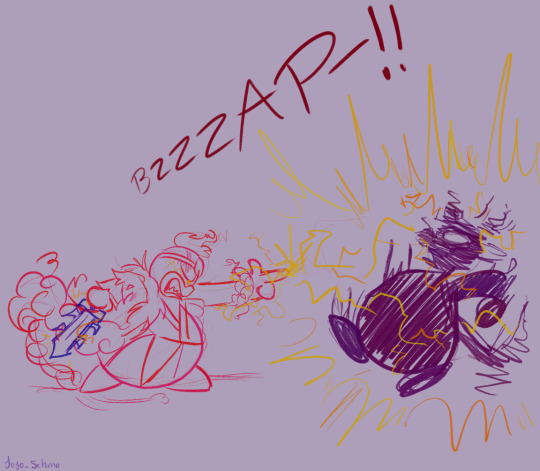
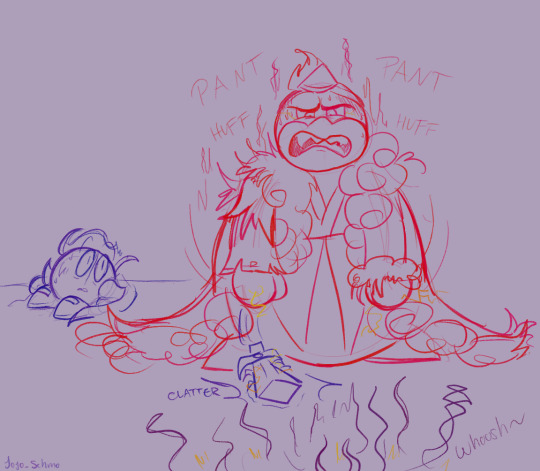
Metadede Week Day 4: Swap
I got a little.... ambitious with this one and needed to split it in two hahaha. The ideas just kept coming uncontrollably!!
I gave them a Parallel/Clone/Non-specific hostile alternate version of themselves to fight here. Happens a lot in the games, huh? What would happen if these two had to utilize the others' weapon? Dedede's is just a powerful and large hammer, but Galaxia is a sword with many special properties...
This scenario is going off of my theory that Dedede is an excellent conductor of the elements- which is why he often utilizes the elements around him in boss battles and why elements/beings like Dark Matter or other possessive elements seem to flow through him so easily
Galaxia is shown to utilize lightning, especially in the anime. And there was that whole thing in the show where the sword may destroy anyone deemed an unworthy wielder...
But I'll elaborate more in part 2 hehehe >:3
Part 2
(Also shout out to @das-a-kirby-blog for being the op of the Dedede's powers theory that I piggybacked off of :D You are cool and rad!!)
#I can't believe how out of hand this prompt got for me HAHAHA#this deadass started as a four panel thing but then I kept thinking of more actions#and now I have like a forty panel monster of a sketch story HAHA#lasers are shooting out of my eyes!!!#mtddd week 2023#metadede#king dedede#meta knight#mtddweek2023
540 notes
·
View notes
Text
TGCF: My theory on the inspiration behind the 4 calamities
In some of the oldest Chinese myths and legends, there are 4 guardian gods of the four cardinal directions - the green dragon, white tiger, crimson bird, and black tortoise, and each have a colour, season and element associated with them.
I'm not sure if anyone has made this connection before, but I'm writing it down if anyone is interested. There are spoilers about the calamities' identity.
First, the 青龙 (qing long, green dragon) --> Qi Rong, Night-touring Green lantern.
The qinglong's territory is the East, and its colour is qing, which means green, or turqoise. Its element is wood, and its season is spring. Closely associated with royalty and the imperial family.
Now, for the similarities with our favourite green goblin. "qing" is literally the colour in Qi Rong's title, and his colour scheme. Qi Rong has a habit of hanging corpses from trees, which may be his relation to the element "wood". He does not have any obvious coleration with the season "spring"- perhaps he was born in spring. He is royalty, part of the imperial family as cousin to the crown prince.
Second, the 白虎 (bai hu, white tiger)--> Bai Wuxiang, White Clothed Disaster upon the Earth.
The baihu's territory is the West, its colour is white, element is gold/metal, and its season is summer. It is the king of all beasts, associated with disease and war, often used as a guardian symbol by soldiers.
On the other hand, Jun Wu's title, alias and colour scheme are all white, and has plenty of weapons that may be his link to the element of "gold/metal". I don't think he has anything to do with summer, but feel free to correct me if I'm wrong. He is king of the gods, a god of war, and the one to spread the human face disease.
As east and west are considered a pair, the guardian spirits are meant to reflect each other. In Chinese poems and such, symmetry is important, and both Qi Rong and Jun Wu were princes, one becoming revered by the highest of gods, covered with masks and false identities, one becoming the object of disgust by the lowest of ghosts, using his real name and face. There is a certain poetic symmetry to it, don't you think?
To the second pair. The 朱雀 (zhu que, crimson bird)----> Hua Cheng, Crimson Rain Sought Flower
The zhuque rules over the south, its colour is red, element is fire, and its season is summer. It is the king of all birds, more powerful than even the phoenix, immortal and undying. As such, in many places it is also considered a symbol of life.
Now, to the most popular ghost king: Hua Cheng. The english translation of his title is "crimson", and his colour scheme is indubitably red and autumn-y shades. He also re-re-met Xie Lian in autumn ( I think - I mean, the leaves were all red in the donghua??), and has died again and again to return like the zhuque. He is the king of all ghosts, with a great determination to live(sorta? are ghosts alive??) for his love.
Lastly, my personal favourite, the 玄武 (xuan wu, black tortoise)---->He Xuan, Black Water Sinking Ships
The xuanwu, also called a tortoise, is actually the only spirit to be a combination of 2 animals, a snake and a tortoise. It rules over the north. Its colour is black( sometimes depicted as dark blue), element is water, and its season is winter. In earlier legends, he is considered a guide and guardian to the netherworld, of death and of long life.
Thus, to our poor indebted water ghost. He Xuan's name is "xuan", the same! goddamn! character! as the spirit! His title and colour scheme are all to do with the colour black, and he is a water ghost because he died because of the Water Master. He has been marked by death, yet survived and vowed revenge. This, and the fact that his house is called the Nether Water Manor, is probably his relation to the netherworld of the xuanwu.
To the pair of south and north. Both Hua Cheng and He Xuan have suffered and suffered again, yet Hua Cheng chooses to linger on due to hope and love, and He Xuan due to revenge and hatred. But hatred and love are two sides of the same coin. If Hua Cheng hadn't experienced the hatred from his childhood, he wouldn't have thrown himself from the city wall and met Xie Lian. If He Xuan hadn't loved his family, so much, he wouldn't have broken that hard after their deaths to lose himself to hatred and empty vengence.
Aaaaaand that concludes this essay. Keep in mind that this is a theory, and probably even isn't true, but if anybody wants a more detailed description of the guardian spirits, or to know more about the similarities between the mythical creatures of ancient china and tgcf, I will be more than happy to make a part 2.
Thanks for reading!!
#he xuan#tgcf#bai wuxiang#hua cheng#qi rong#four great calamities#heaven official's blessing#tian guan ci fu#black water submerging boats#black water sinking ships#night-touring green lantern#crimson rain sought flower#white-clothed calamity#shan hai jing#meta#tgcf meta
466 notes
·
View notes
Text
Lash Legend ~ Trick Williams
73 notes
·
View notes
Text

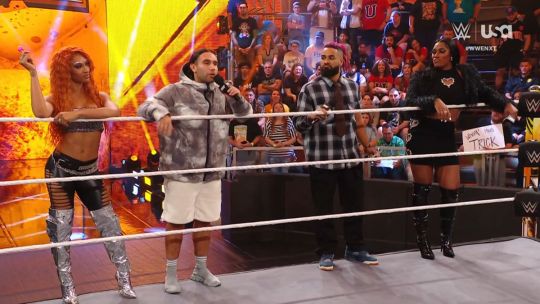
There is no NXT without a Meta-Four sighting.
24 notes
·
View notes
Text
Rescuing Aziraphale isn't what makes Crowley happy, not really. He doesn't want him to be in danger in the first place. He wants him safe. He wants him happy.
But he does like having an excuse to take care of him, to protect him, to dote on him in a way that's safe, acceptable and would be honestly illogical to turn away. Like Crowley walks into that church, burning his feet all the way and Aziraphale nearly shoos him away? (Because of the fight all those years ago, because he must be in league with these Nazis) But Aziraphale is in actual, real danger of being discorporated, of being sent back to heaven for who knows how long, so how can he actually reject Crowley's offer to protect him, right?
So every time Crowley does this, the whole "gallant knight swooping in to save Aziraphale from his own follies" thing, it's basically completely irrejectable, safe love Crowley can offer up to Aziraphale with no fear of rejection or overstepping the invisible line between them. Aziraphale can say "you go too fast for me, Crowley" a hundred times in so many varied ways and Crowley accepts this but he's never going to reject Crowley's love when it comes to him as a hand pulling him free of oblivion. That's what Crowley likes. Being able to love Aziraphale in a way that he knows will never be rejected.
#good omens#good omens meta#ineffable husbands#ineffable partners#aziracrow#aziraphale#crowley#good omens crowley#good omens 2#GOS2 Spoilers#My GO Thoughts and Feels#look I posted one of these four days in a row go me!#someday here I'm gonna count how many of these posts i have unposted for the fun of it just watch me lols#also maybe make a post where I link all my good go meta and pin it to the top of my blog?#idk how to use tumblr anymore everyone please be patient with me
646 notes
·
View notes
Text
it's honestly a bit odd to me that so many people have jumped on the 'aziraphale will be pulling all the strings and playing politics in heaven' train. like I think it's true that the metatron is underestimating aziraphale's intelligence and ability to disrupt the second coming even while separated from crowley, but I also think the idea that aziraphale is going up to heaven with a clear idea of how he's just been lied to, an understanding of how much danger he's in, and a plan to stop it is a huge reach.
frankly, aziraphale is very vulnerable to manipulation. I'm thinking now of neil’s post with the diary entry from before the edinburgh minisode where he was duped by two humans, the whole thing with the nazis in 1941, and his sponsorship of shadwell's various obviously fake agents (sergeant milkbottle, etc.). he's not nearly as savvy as fanon tends to portray him. he takes people at face value, especially people he thinks of as Good. (that's not a dunk, btw--I find these things endearing, and a sign of aziraphale's innate wish to see the best in people. I just think that sometimes the BAMF protective aziraphale of fanon overshadows the slightly more naive aziraphale of canon. and honestly, I also think TV aziraphale is just a bit softer than book aziraphale, though he is capable of stepping up when it counts.)
and he's a bad liar! I know it's a meme in the fandom that aziraphale lies all the time, but he doesn't like it, and he's bad at it. he gets nervous and comes up with terrible excuses and the only reason he ever gets away with it is because the people he's lying to are idiots (gabriel), have their own agendas (god, the other archangels), or trust him to be honest (crowley).
aziraphale's real strength is his ability to take sudden, completely unexpected action. that's one of the things that crowley admires most about him. "he's unpredictable," is what he says to nina, and it's true! aziraphale's greatest moments of rebellion have always come from spur of the moment decisions, not intricate plans. (if anything, crowley is the planner--the arrangement and the thwarting of the apocalypse, their two longest cons, were both his idea.)
aziraphale gives the sword away because when he is forced to make a decision under pressure, he tends to land on the side of rebellious kindness. shielding crowley from the rain in eden, lying to gabriel to protect job's family, defying the quartermaster and returning to earth via possession during the apocalypse, blowing up his halo--he does these things because he's following that same impulse. when aziraphale has time to over think, he frets and fusses and is paralyzed by indecision. (or worse, he falls back on what heaven has taught him.)
TL;DR: I don't think aziraphale has any sort of grand plan other than a generalized "make things better," and I certainly don't think he is planning to betray heaven. he might try to come up with a plan once he figures out how bad things are going to get, but my bet is that what will actually disrupt the second coming is an absolutely bonkers off the wall decision that no one, crowley included, could ever predict. and I think it’ll happen, as it usually does with aziraphale, just after he accepts a difficult truth that fundamentally shifts his worldview—in this case, his final rejection of the idea of “good” and “bad” people, and of the entire morality system of heaven and hell.
#good omens#good omens 2#good omens meta#final fifteen#aziraphale#long post#been in a meta mood lately sorry#to be clear people can write whatever they want. playing with characterization is fine and good in fanworks#but also I do wonder if the fanon built over four years between seasons is seriously impacting the way people read the final fifteen#and because I suspect it will come up: his smile in the elevator reads as Aziraphale’s denial smile#the one where he plasters it on as a ‘this is fine this is what I want I am a Good Angel’ reaction#‘I’m not trapped in here with you you’re trapped in here with me’ is not a thought aziraphale would ever have about himself#he doesn’t think about himself that way#crowley thinks of him as a force to be reckoned with for sure. but aziraphale is not that sure of himself
160 notes
·
View notes
Text
i've been binging ten's series (for the hundredth time) and losing my mind (again) over the doctor and donna's matching outfits
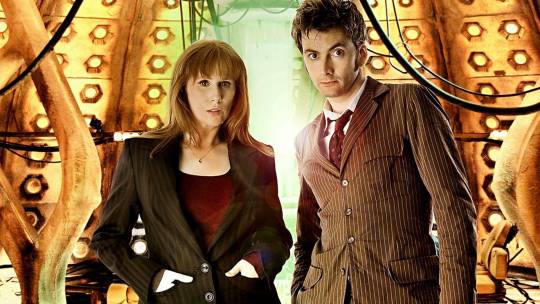

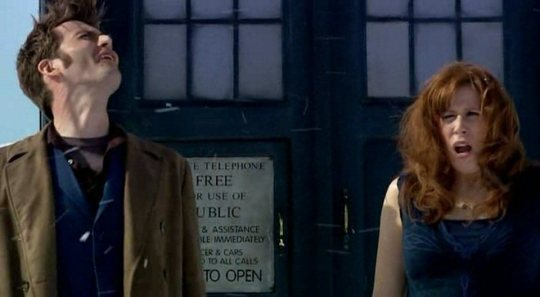
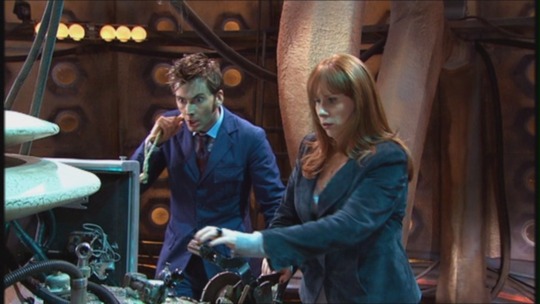


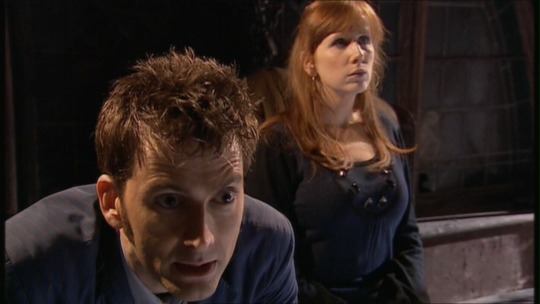
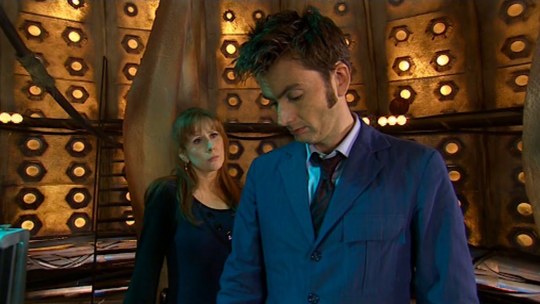


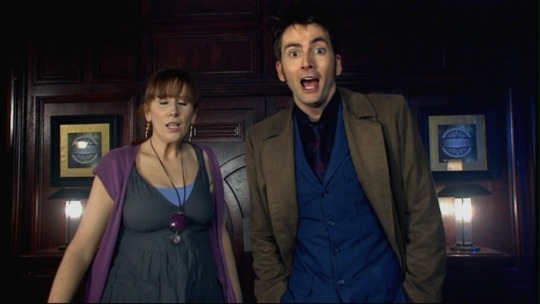
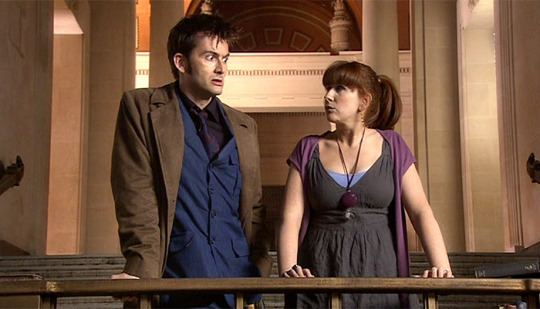
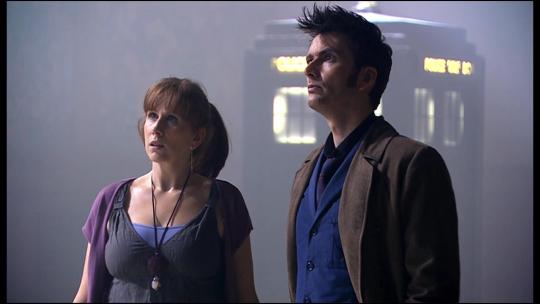


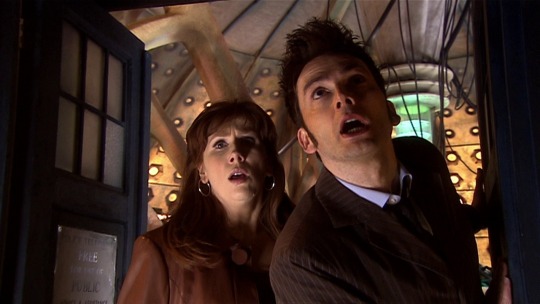
the doctordonna !!!!!!!!!!!
#the symbolism !!!! the platonic soulmatism !!!!! the visual representation of the fact they're heading towards sharing one mind !!!#series four is so fucking good it makes me want to chew glass !!!!!!#doctor who#dw s4#dw meta#ten & donna#ten#donna noble#doctordonna
213 notes
·
View notes
Text

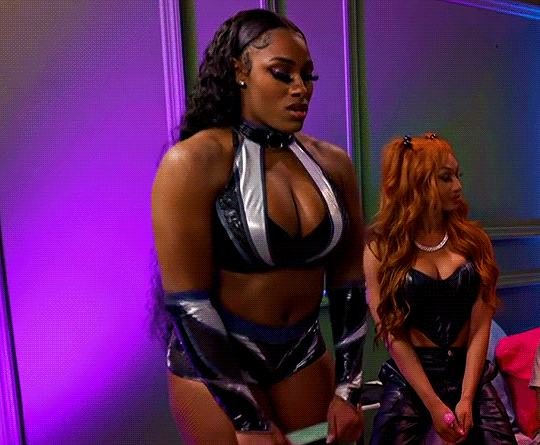
Lash Legend & Jakara Jackson
NXT 20/02/2024
#wwe#wweedit#nxt#lash legend#jakara jackson#nxtedit#wwe nxt#meta four#stuff i made#ladies please ****-***** meeeeee
174 notes
·
View notes
Text
The Cupperty Ceremony

Every bit of food and drink in both seasons has a metaphorical significance, even if you don't realize it.
Tea is no exception. Its one of the few times an eastern philosophy creeps into Good Omens, but it still meets with a western ideal. It's also intrinsically linked to Aziraphale and his affected British style.
Coffee gets more of a focus in S2, and has a specific meaning around freedom and liberty, whereas tea appears more in S1. But the metaphorical meanings around them are fairly consistent across both seasons, with stereotypes for the British drinking tea and the Americans only drinking coffee put aside.
Lets start with Muriel on the doorstep of the bookshop, at the beginning of S2E3, asking to come in, because its noisy outside.
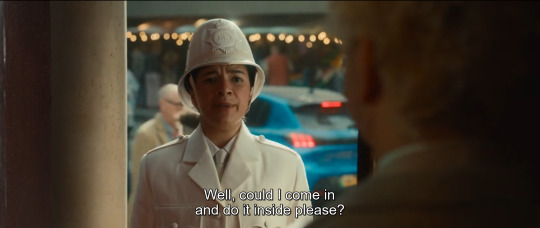

Aziraphale, after a moment to take in who they are, is the epitome of politeness as he welcomes them inside.
You might think "well, isn't this just Aziraphale being typically Aziraphale?" in this moment, but soon we shall see its a relevant part of a ritual going on here.
The bookshop is noticeably quieter on the inside. There is just the two of them. Aziraphale offers Muriel tea in a fine china cup, with a blue pattern, and gold trim.

Muriel is not sure what to do with it so they just hold it. Aziraphale makes a point of demonstrating what should be done: He tells Muriel the tea is "to drink," then looks at it, sips, and makes both an appreciative expression and sound.


Muriel seems repelled by this, and declares they are just going to look at theirs. Aziraphale patiently, still polite, lets them do so.
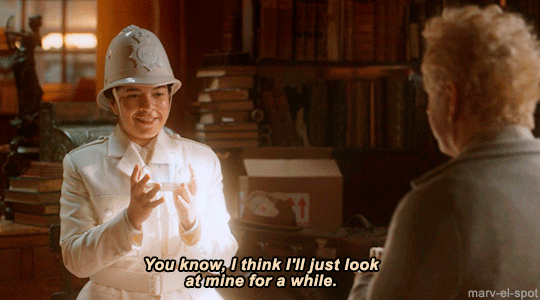
Up to this point, there are actually two levels of meta happening at the same time. The first one is a tea ceremony (which I had a go at once before, and got the wrong one!) and the other is about trying to get Muriel to take the first step in "going native."
A tea ceremony always starts with a courteous invitation. The tea is prepared, then served and offered to others. It should be taken in a tranquil, peaceful setting, perhaps in a harmonious natural environment (such as a Garden) and with only a few people at a time (two people is considered a "superior" experience.) The tea ware is important, as it should allow the fragrance of the tea to be appreciated (we have some fine china, Heavenly-coded.) Appreciation of the tea's qualities is undertaken, first with the eyes, then by smell, then tasting. It is considered an art, a process of spiritual enjoyment, a means of cultivating the moral character - and then Crowley bursts into the bookshop with his flirty comment about going by train and breaks the fragile connection Aziraphale had been trying to establish with Muriel.
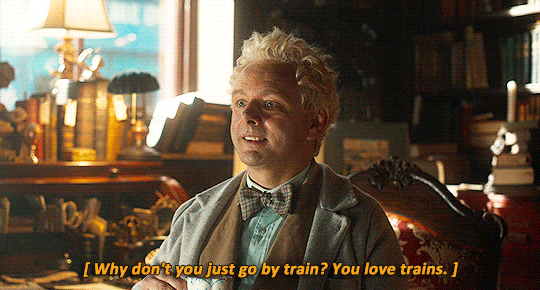
*sigh* Timing, Crowley! Can't you see I'm in the middle of trying to subvert a fellow angel here?
I was recently reminded that tea and coffee have a connection in GO, in that that they are both linked to the American War of Independence. While the speech that gives us "Give me liberty, or give me death!" conjures the stormy winds of war sounding trouble approaching, the Boston Tea Party was the initial spark of the brewing conflict.
I realize there is a LOT of stuff written about this particular bit of history, and it can get quite political even in these modern times, so let me frame it in a Good Omens frame of reference if you aren't familiar with it - the colonists in the New World were upset at how they were being ruled from afar by the British and staged a small protest about some new laws imposed on them by dumping ship-loads of valuable tea leaves (a daily consumable pleasure people had become hooked on) into Boston Harbor on the night of 16th December 1773. To disguise themselves they dressed themselves as indigenous people, or "native Americans" as one might have said. This was just the beginning of further rebellion that led to war a few years later.
So here is another reason Aziraphale offers tea to Muriel, and not cocoa; he can see how fascinated they are with with everything Earthly around them, and he hopes to ignite a spark of rebellion in them, too, by introducing them to the more civilized pleasures (*ahem*) that he knows and enjoys so well.
While there is little tea to be seen in S2, there is plenty to be seen in S1. Perhaps the most prominent one for this discussion occurs right near the beginning, when Gabriel surprises Aziraphale in the sushi restaurant in S1E1.
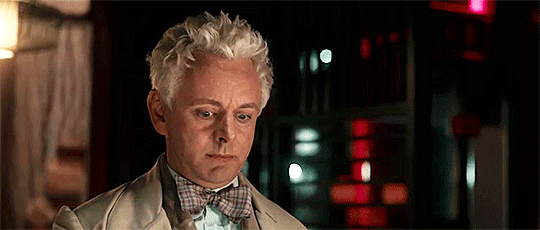

Aziraphale offers to tea to Gabriel, and Gabriel shuns it. He, like most of the angels we meet, have no real interest in Earth. It's "gross." Ah, well. He gets to change his mind in S2.
So where else do we see tea in S1?
The Four Horsepeople: War orders four teas, one black, and a cheese sandwich in the diner where they all meet up together for the first time on Earth. We don't know who the sandwich is for, but I'm going to guess its for Famine. Reasons below, with Shadwell. (Cheese and tea make a nice savoury pair for a snack, if you haven't tried it. I'm partial to tea with cheese and crackers on the side from time to time.)
The Tibetan Tunnelers were on tea break from digging tunnels all over the Earth when we meet them, where they mention they were transported into the tunnels when they themselves stopped for tea back in their real lives on the surface.
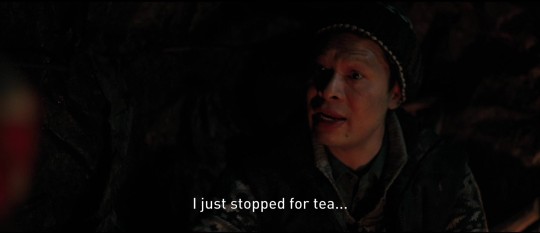
Shadwell's infamously sweet tea, with either nine sugars or condensed milk, needs a mention as well, as it appears several times. Shadwell is an Aziraphale parallel-character, living on the fringes of society and starving for attention, even though he makes feeble swipes at Madam Tracey's attempts to care for him. The sugar represents the amount of care or "sweetening up" he needs.
When he first meets Newt he gets the young man to buy him a tea and a packet of cheese and onion crisps. Remember the cheese sandwich War ordered for Famine? A packet of cheese flavoured crisps is a parallel here. Newt has turned up and finally given someone Shadwell someone to sink his teeth into.

Finally, we need to return to Crowley - its coffee, as black as his soul for him, please, and extra strong (six shots is for the number of Hell.)
Because he's already "gone native," just like Aziraphale, and he wants to maintain his freedom. He's left the Garden, and Heaven, behind him, and he'll do anything to keep it that way, thank you.
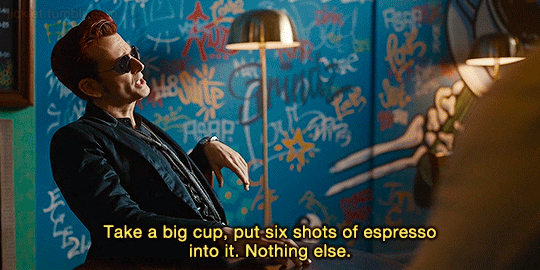
I'd like to thank my mutual and other food meta writer @vidavalor for discussing some of this off-list some time ago. We mostly see things the same way, I believe, but one must tread one's own path sometimes. They have some different ideas around some of this, but I'll let them say it in their own words.
#good omens#good omens 2#good omens meta#aziraphale#muriel#gabriel#four horsepeople of the apocalypse#shadwell#the tibetan tunnelers#and a cheese sandwich#six shots of espresso#gone native#gross matter#it's what humans do#tea ceremony#cup of tea#cupperty
167 notes
·
View notes